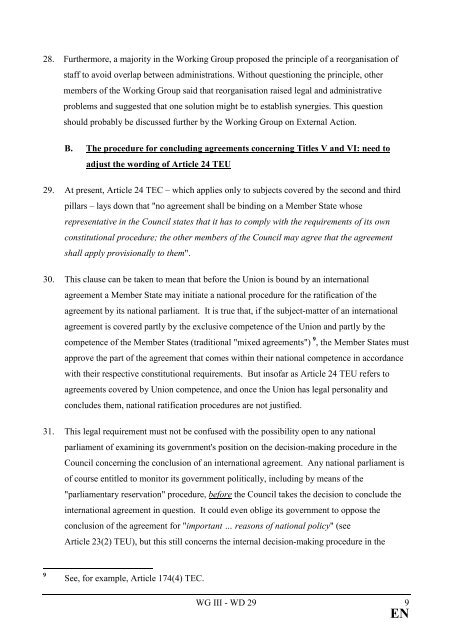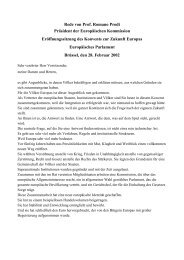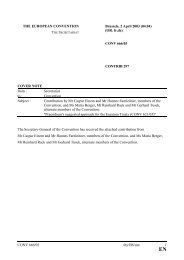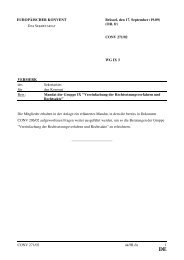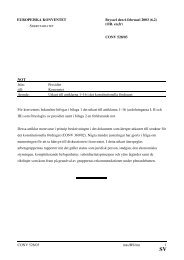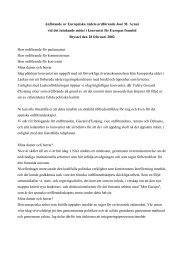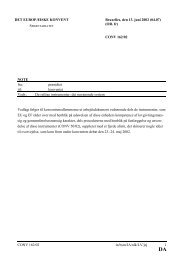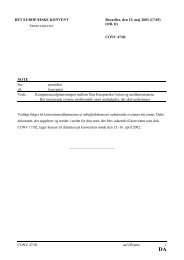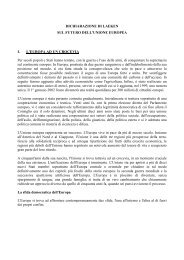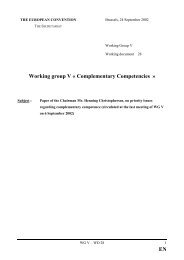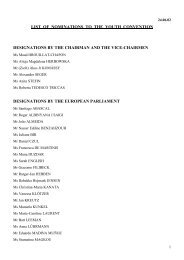WG III - WD 29 1 THE EUROPEAN CONVENTION Brussels, 24 ...
WG III - WD 29 1 THE EUROPEAN CONVENTION Brussels, 24 ...
WG III - WD 29 1 THE EUROPEAN CONVENTION Brussels, 24 ...
You also want an ePaper? Increase the reach of your titles
YUMPU automatically turns print PDFs into web optimized ePapers that Google loves.
28. Furthermore, a majority in the Working Group proposed the principle of a reorganisation of<br />
staff to avoid overlap between administrations. Without questioning the principle, other<br />
members of the Working Group said that reorganisation raised legal and administrative<br />
problems and suggested that one solution might be to establish synergies. This question<br />
should probably be discussed further by the Working Group on External Action.<br />
B. The procedure for concluding agreements concerning Titles V and VI: need to<br />
adjust the wording of Article <strong>24</strong> TEU<br />
<strong>29</strong>. At present, Article <strong>24</strong> TEC – which applies only to subjects covered by the second and third<br />
pillars – lays down that "no agreement shall be binding on a Member State whose<br />
representative in the Council states that it has to comply with the requirements of its own<br />
constitutional procedure; the other members of the Council may agree that the agreement<br />
shall apply provisionally to them".<br />
30. This clause can be taken to mean that before the Union is bound by an international<br />
agreement a Member State may initiate a national procedure for the ratification of the<br />
agreement by its national parliament. It is true that, if the subject-matter of an international<br />
agreement is covered partly by the exclusive competence of the Union and partly by the<br />
competence of the Member States (traditional "mixed agreements") 9 , the Member States must<br />
approve the part of the agreement that comes within their national competence in accordance<br />
with their respective constitutional requirements. But insofar as Article <strong>24</strong> TEU refers to<br />
agreements covered by Union competence, and once the Union has legal personality and<br />
concludes them, national ratification procedures are not justified.<br />
31. This legal requirement must not be confused with the possibility open to any national<br />
parliament of examining its government's position on the decision-making procedure in the<br />
Council concerning the conclusion of an international agreement. Any national parliament is<br />
of course entitled to monitor its government politically, including by means of the<br />
"parliamentary reservation" procedure, before the Council takes the decision to conclude the<br />
international agreement in question. It could even oblige its government to oppose the<br />
conclusion of the agreement for "important … reasons of national policy" (see<br />
Article 23(2) TEU), but this still concerns the internal decision-making procedure in the<br />
9 See, for example, Article 174(4) TEC.<br />
<strong>WG</strong> <strong>III</strong> - <strong>WD</strong> <strong>29</strong> 9<br />
EN


